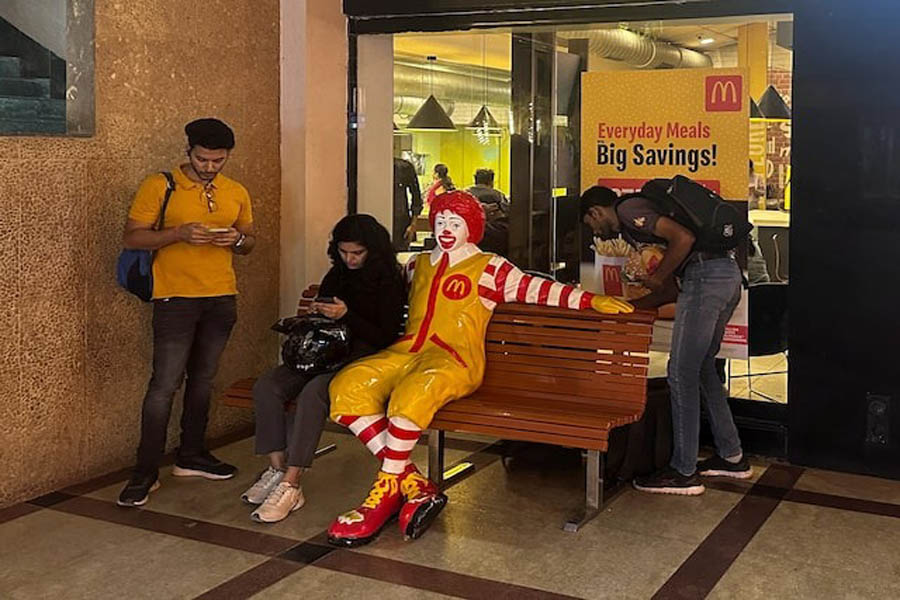Saif
Senior Member
- Joined
- Jan 24, 2024
- Messages
- 15,397
- Reaction score
- 7,865
- Points
- 209
- Nation

- Residence

- Axis Group


In India, Trump's tariffs spark calls to boycott American goods
From McDonald's and Coca-Cola to Amazon and Apple, US-based multinationals are facing calls for a boycott in India as business executives and Prime Minister Narendra Modi's supporters stoke anti-American sentiment to protest against US tariffs. India, the world's most populous nation, is a key mar
In India, Trump's tariffs spark calls to boycott American goods
Published :
Aug 11, 2025 13:57
Updated :
Aug 11, 2025 13:57

From McDonald's and Coca-Cola to Amazon and Apple, US-based multinationals are facing calls for a boycott in India as business executives and Prime Minister Narendra Modi's supporters stoke anti-American sentiment to protest against US tariffs.
India, the world's most populous nation, is a key market for American brands that have rapidly expanded to target a growing base of affluent consumers, many of whom remain infatuated with international labels seen as symbols of moving up in life, as per a Reuters report.
India, for example, is the biggest market by users for Meta's WhatsApp and Domino's has more restaurants than any other brand in the country. Beverages like Pepsi and Coca-Cola often dominate store shelves, and people still queue up when a new Apple store opens or a Starbucks cafe doles out discounts.
Although there was no immediate indication of sales being hit, there's a growing chorus both on social media and offline to buy local and ditch American products after Donald Trump imposed a 50 per cent tariff on goods from India, rattling exporters and damaging ties between New Delhi and Washington.
McDonald's, Coca-Cola, Amazon and Apple did not immediately respond to Reuters queries.
Manish Chowdhary, co-founder of India's Wow Skin Science, took to LinkedIn with a video message urging support for farmers and startups to make "Made in India" a "global obsession," and to learn from South Korea whose food and beauty products are famous worldwide.
"We have lined up for products from thousands of miles away. We have proudly spent on brands that we don't own, while our own makers fight for attention in their own country," he said.
Rahm Shastry, CEO of India's DriveU, which provides a car driver on call service, wrote on LinkedIn: "India should have its own home-grown Twitter/Google/YouTube/WhatsApp/FB -- like China has."
To be fair, Indian retail companies give foreign brands like Starbucks stiff competition in the domestic market, but going global has been a challenge.
Indian IT services firms, however, have become deeply entrenched in the global economy, with the likes of TCS and Infosys providing software solutions to clients world over.
On Sunday, Modi made a "special appeal" for becoming self-reliant, telling a gathering in Bengaluru that Indian technology companies made products for the world but "now is the time for us to give more priority to India's needs." He did not name any company.
Published :
Aug 11, 2025 13:57
Updated :
Aug 11, 2025 13:57
From McDonald's and Coca-Cola to Amazon and Apple, US-based multinationals are facing calls for a boycott in India as business executives and Prime Minister Narendra Modi's supporters stoke anti-American sentiment to protest against US tariffs.
India, the world's most populous nation, is a key market for American brands that have rapidly expanded to target a growing base of affluent consumers, many of whom remain infatuated with international labels seen as symbols of moving up in life, as per a Reuters report.
India, for example, is the biggest market by users for Meta's WhatsApp and Domino's has more restaurants than any other brand in the country. Beverages like Pepsi and Coca-Cola often dominate store shelves, and people still queue up when a new Apple store opens or a Starbucks cafe doles out discounts.
Although there was no immediate indication of sales being hit, there's a growing chorus both on social media and offline to buy local and ditch American products after Donald Trump imposed a 50 per cent tariff on goods from India, rattling exporters and damaging ties between New Delhi and Washington.
McDonald's, Coca-Cola, Amazon and Apple did not immediately respond to Reuters queries.
Manish Chowdhary, co-founder of India's Wow Skin Science, took to LinkedIn with a video message urging support for farmers and startups to make "Made in India" a "global obsession," and to learn from South Korea whose food and beauty products are famous worldwide.
"We have lined up for products from thousands of miles away. We have proudly spent on brands that we don't own, while our own makers fight for attention in their own country," he said.
Rahm Shastry, CEO of India's DriveU, which provides a car driver on call service, wrote on LinkedIn: "India should have its own home-grown Twitter/Google/YouTube/WhatsApp/FB -- like China has."
To be fair, Indian retail companies give foreign brands like Starbucks stiff competition in the domestic market, but going global has been a challenge.
Indian IT services firms, however, have become deeply entrenched in the global economy, with the likes of TCS and Infosys providing software solutions to clients world over.
On Sunday, Modi made a "special appeal" for becoming self-reliant, telling a gathering in Bengaluru that Indian technology companies made products for the world but "now is the time for us to give more priority to India's needs." He did not name any company.

